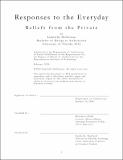Responses to the everyday reliefs from the private
Author(s)
Heffernan, Gabrielle(Gabrielle Joyce)
Download1236890731-MIT.pdf (26.46Mb)
Other Contributors
Massachusetts Institute of Technology. Department of Architecture.
Advisor
Rosalyne Shieh.
Terms of use
Metadata
Show full item recordAbstract
In pursuit of an architecture of the everyday, this investigation applies fascinations with and imaginations of the ordinary to architecture's possibilities for relief in today's increasingly privatized notion of the public. Our neoliberal reality dictates an incessant change in urban landscapes - from enclaves of difference to havens of increasing homogeneity ruled by the holders of capital. Transitioning urban ethnographies often occur in pursuit of accessible economies and shelter as resources become inaccessible. Though the cycle is inevitable, there remain opportunities for relief in the form of de-commercialized public space and public architectures for commerce. East Boston has historically served as an enclave to consistent influxes of foreign-born populations in Boston. The coexistence between various populations is both intermingled and separate - coded in our urban environments which host multiple worlds. Responses to the Everyday, posits the roles of body-scaled to small-building-scaled architectures in mobilizing existing and incoming populations with shared resources for continued participation in East Boston's largely service-industry economy. Rather than mobilizing profit-agenda-pushing development, smaller interventions on existing sites of public space offer potential sites of relief to a cycle of forced displacement due to increasing privatization. Responses to the Everyday seeks to maintain difference in the neighborhoods surrounding Maverick Square by reinstating public ownership - to provide alternatives to the glossy, singularly-owned, and homogeneous. This range of potential built structures operates within and between three existing sites to support the continuation of difference through architectures of access. Access is architecturally provided through structures of shared capital, knowledge, and space, which inform programs such as collective commercial kitchens, market stalls, kiosks for shared information, and evolving memorials. Its architecture arises from accessible materials and labor to imagine achievable structures - potentially altered and replicated by various. Each acts as a container for resources in response to today's landscape of everyday activities and economic exchange in East Boston.
Description
Thesis: M. Arch., Massachusetts Institute of Technology, Department of Architecture, February, 2020 Cataloged from student-submitted thesis. Includes bibliographical references.
Date issued
2020Department
Massachusetts Institute of Technology. Department of ArchitecturePublisher
Massachusetts Institute of Technology
Keywords
Architecture.